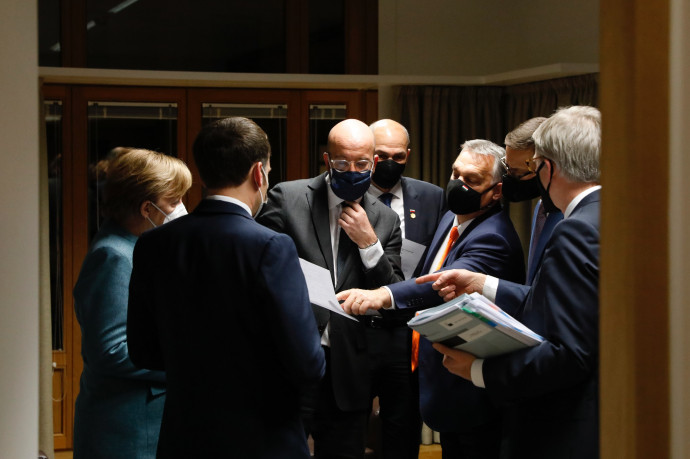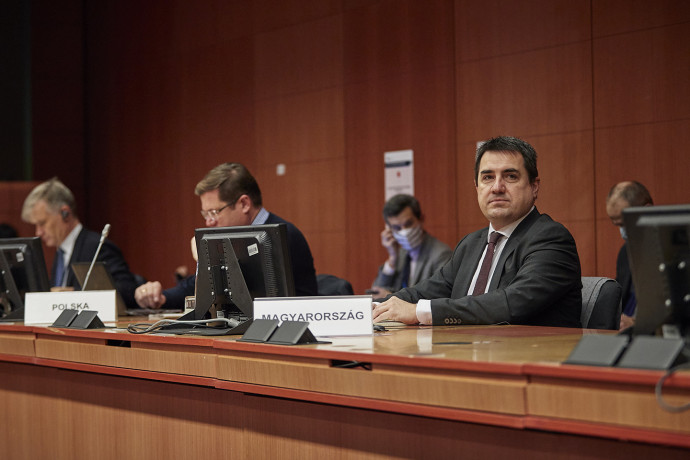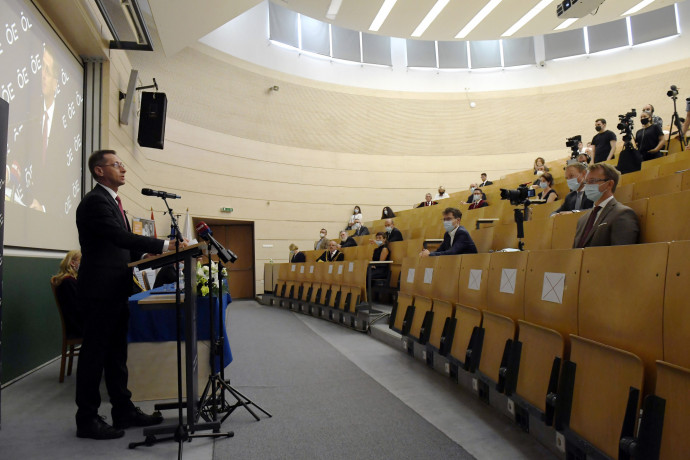Orbán already preparing steps for after ECJ ruling

On February 16, the European Court of Justice will hand down the final verdict in a case brought by the Hungarian and Polish governments over the so-called rule of law mechanism. Not long after, on March 24-25, at the EU summit, the agenda will include the years-long examination into the erosion of the rule of law in Hungary. This is likely to be the hardest EU hearing of Viktor Orbán yet – held within a week before the parliamentary elections in Hungary. Even if their attempt to stop the mechanism does not succeed, the Hungarian government might challenge the European Commission's procedure by other judicial means – thus securing EU payments. Translation by Andrea Horváth Kávai.
“It is our firm opinion that the EU institutions’ and member states’ approach to the Conditionality Regulation should be based on conclusions born out of a consensus established between heads of state – so on the highest possible political level. The present request for information cannot therefore, in my view, be interpreted in the context of the Regulation. It is answered in compliance with the principle of loyal cooperation, and with the intent to inform.”
This is in Hungary’s informal – said to be professional – answer sent by the country’s ambassador to Brussels on behalf of the Hungarian government to the Chief Executive in regards to the so-called request for information pertaining to the rule of law mechanism. This more than 50-page long letter reveals that the primary reason why the Hungarian government sees the EC’s line of questioning as illegal is that the Court of Justice has not ruled on the legality of the entire mechanism yet.
The letter, signed by ambassador Tibor Stelbaczky claims that the government is only answering the Commission as a courtesy, and does not consider the correspondence official. On several occasions, it questions the interpretative abilities and procedures of the executive board as well as whether there is any EU competence at all, for example in matters concerning the Hungarian judiciary.
The Commission contacted the Hungarian government with questions about corruption in the middle of November of last year. This letter (said to be informal) was the first step of the rule of law mechanism. It was sent with the purpose of naming specific cases and topics which raise the issue of systemic corruption, judicial independence, as well as the violation of the protection of public procurements, and EU funds in general, in Hungary.
What does this have to do with the LMBTQ lobby?
In short: nothing. Before reviewing the “arguments” of Viktor Orbán and his team against the expectations for rule of law, it is worth remembering where all the arguing around the rule of law, i.e. the conditionality mechanism started. While in early February the prime minister went as far as to say that the forthcoming European Court of Justice ruling (which will aim to ensure that the rule of law criteria can be taken into account when determining the proportions of EU money to be allocated) could even threaten the country’s sovereignty, it was actually Orbán himself who initiated the legal action. He was the one who involved the Court of Justice of the European Union in what had previously been a political debate. In spite of this, most recently, the prime minister has been making comments like this one in his on-line, English language diary:
“...the Court of Justice sees a federal Europe as being desirable. This is not a big surprise: when it has seen the machinery of European integration stalling, the Court has always pushed the EU towards federalism; it has purposefully extended its powers and undermined the bulwarks of national sovereignty. These decisions are in reality not legal in nature but political, with the law simply being used as an instrument to enforce a political resolution.”
By contrast, in December 2020, the European Council, composed of the member countries’ Heads of State confirmed the agreement reached at the EU summit in July on the next seven-year budget for the European Union and the recovery fund for the aftermath of the coronavirus epidemic. As part of the package, they had also agreed that the use of the EU budget, the use of the citizens’ money would be subject to proper control, including a set of rule of law criteria for all 27 member states. The regulation included a clause which states that the mechanism for overseeing EU funds can only be triggered if the actions of a member state are harming the financial interests of the European Union. In case of the mechanism's application, the EC may propose opening a conditionality procedure, if it finds that a member state is committing an infringement or that there is a persistent and systemic breach of the rule of law in that country.
According to the text, the legislation is to be applied not only in individual cases, but also when there is a systemic breach of fundamental rights, and this is impacting the management of EU funds. Although such a procedure has never before been applied in the EU, the rule of law mechanism essentially makes it possible to withdraw support funds from a member state in case of the poor state of its democracy. Since this debate has been going on in Europe since almost 2012, and there has been an increasing number of calls for a new system of sanctions – mainly due to the series of measures introduced by the Hungarian and Polish governments that have violated the rule of law and EU law – the debate has been a long one. This went as far as the Hungarian and Polish governments blocking the seven-year budget and the establishment of the 750 billion euro recovery fund, claiming that the rule of law regulation connected to it infringes on the original decision of the member states.
Budapest and Warsaw eventually backed down from the veto, and in the Council even Orbán himself voted to draft the legislation, officially known as the "general conditionality for the protection of the EU budget".

The gist of the provision is that the European Commission can decide to suspend, withdraw or reduce the flow of EU funds if it deems the use of EU funds endangered due to a breach to the rule of law. In theory, the court proceedings are not suspensive, so the EU law is valid as of January 1, 2021.
However, primarily in order to avoid the huffing and puffing of the Orbán government, at their December 2020 meeting, the heads of state also agreed that the European Commission would draw up a guide on the methodology for the application of the rule of law mechanism. And as the document shows, this was indeed done:
"In the event of an action for the annulment of the Regulation, the guidelines will be finalised only after the Court's judgement, so that its relevant points can be incorporated into the guidelines. The President of the Commission will keep the European Council fully informed. The Commission will not propose any measures to be taken based on the Regulation until the guidelines have been finalised.”
Since EU law already guarantees redress to the member states in each case, many did not understand the need for this – but in December 2020, Orbán's team managed to convince former German chancellor, Angela Merkel to include this paragraph in the text. The Hungarian and Polish governments voted no in the final, written vote on the draft of the rule of law regulation. Since unanimous support is not required for its adoption, and at the same time all member states unanimously voted yes on the regulation of the 2021-2027 budget and the recovery fund, this effectively removed the danger of the Hungarian and Polish veto.
In appropriate fashion, on the last possible day, in February 2020, the Hungarian and Polish governments brought a joint action before the EU Court of Justice. The final judgement in this case is expected to be announced on Wednesday, February 16th. This trial is a fast-track case, and is exceptionally processed before a panel of 27 judges from all 27 Member States. Furthermore, 10 governments have indicated that they are requesting the dismissal of the Hungarian-Polish action and for the rule of law mechanism to remain in force. Simply put: Ireland, Holland, Germany, France, Finland, Sweden, Denmark, Luxembourg, Belgium and Spain have lined up against Hungary and Poland in the legal procedure.
In December, the Advocate General of the European Court of Justice recommended that the Court reject the Hungarian and Polish government’s claims, since the rule of law regulation is in line with EU law. According to the Advocate General, the mechanism was adopted on the correct legal basis, it is compatible with Article 7 of the Treaty on the European Union, and respects the principle of legal certainty.
The Advocate General’s legal opinion does not necessarily mean that the Luxembourg court will rule the same way at the end of the proceedings, although the panel does usually rule in line with it. Such was the case for example with the "Stop Soros" law package, or in the case of Péter Polt and the Curia’s (Supreme Court) infringement of EU law in its proceedings.
Therefore the Advocate General’s proposal may well foreshadow how the Court of Justice of the European Union will rule, which is why the quote from Orbán referenced above has significance, as it shows that he is bracing for his government losing the case.
In the same opinion piece (entitled “Samizdat 16”), at the end of January, Orbán wrote that on February 16, the Court of the EU will rule on the political and ideological conditionality of the financial resources allocated to Member States.
His piece – aiming to influence public opinion in Hungary – is basically calling on Member States not to comply with the judgements of the Luxembourg court, as they are not legal, but political: “EU law does not provide us with instruments that we can use against the political decisions of the Court, and against the extension of powers by stealth. Therefore Member States must take collective action to defend their rights. Member States must not accept a situation in which political decisions are taken by the European Court of Justice, instead of the peoples and governments of the Member States. This cause is not simply Poland’s and Hungary’s: it is the common cause of all European citizens and Member States.” – wrote the Hungarian prime minister.
It would certainly be easy for Orbán to use this as an excuse in February, or even after the EU summit of heads of state in March (where he almost certainly will not be the most popular guy), and to say that just like the rule of law entering into force, the Commission’s letter on the matter, and even the initiation of the procedure itself is a matter of legal dispute. He may even challenge the rule of law examination under Article 7 in court, which would mean that he is preparing for a procedural law case with the EU that might take another few years.
But what would be the point of another legal battle with the EU?
In short: nothing. And that is precisely the point. The only worthwhile result for the Orbán-government would be to delay the threat of suspension of funds to Hungary under the mechanism for as long as possible. If they were aiming to resolve the legal dispute as soon as possible, the government would have shown at least some willingness for compromise in some of the procedures of the Commission. Thus it is all the more interesting to look at the way the Hungarian government has dismissed the arguments and suggestions of the EC in the letter which initiated the procedure for the possible launch of the rule of law mechanism.
In the letter quoted at the beginning – which is dated January 27th, so a few days AFTER the deadline – the Hungarian government aimed to communicate that everything in Hungary is just dandy, and anybody who says otherwise is lying. But let us look at the details! In the first part of his letter, ambassador Stelbaczky wrote about the results the country has achieved in the past 12 years, as well as how much stronger the economy has become.
According to the relevant text, thanks to the government's decisions, the Hungarian economy is growing much faster than the EU average, and it is performing better than the EU. He also mentions the outstanding performance of the Hungarian construction industry, and of green investments. The summary (which might even pass as an advertisement for the country) attempted to sweep the Commission's legal questions off the table with phrases like: "Hungary is an attractive country for investments" and "Hungary remains one of the EU countries with the most favorable unemployment rates."

Non-transparent, manipulated public procurements
Relating to the case of the public procurement procedures, the ambassador wrote that the public procurement law of 2015 is not just fully compliant with the relevant EU directive, but – as recently as February 2021 – even stricter procedures have been introduced in relation to EU public procurements, in line with recommendations from Brussels.
According to the ambassador, the Hungarian public procurement system is performing well by EU standards, and as far as the transparency of the procedures is considered, the country is among the best-performing member states. In his opinion, the criticism about the proportion of single-bid procurements is not justified, as there are five other EU countries which have performed worse than Hungary.
The ambassador also tried to argue that, for example in 2020, 78% of public procurement above the EU threshold was won by small and medium-sized businesses. This ratio, of course, relates to the number of procedures, not the value allocated, but he did not add this detail.
He claims that the fairness of the procedures is ensured by careful monitoring done by the Prime Minister's Office, which assists the Hungarian Competition Authority (GVH) with its findings.
Auctioning off state-owned farmland
The EC has also asked the Hungarian government to report on the ten biggest beneficiaries of the EU's area-based agricultural support, including individuals and companies. The Commission was especially interested in knowing the names of those who have acquired significant amounts of state-owned farmland (and with it large sums of area-based support funds) during the last decade's auctions.
In contrast, in his letter, the ambassador referred rather tersely to the fact that the European Commission had already requested and received relevant data on the 20 most frequent purchasers of state-owned land in a letter sent in March 2020. He also reminded that the Commission itself keeps a register of beneficiaries of EU funds under the common agricultural policy.
Publicly funded foundations filled with Fidesz-affiliated members
The EC says that having Ministers and State Secretaries on boards of trustees in the so-called "public trusts with a public service mission" which now run most of the universities in Hungary could be a cause for concern, due to a conflict of interest and a lack of regulation of trusteeships, since these universities may be beneficiaries of EU support funds. However, the ambassador's letter isn't too bothered with this subject either: "There are a number of common misconceptions and misunderstandings about the operation of public trusts with a public purpose, and the Hungarian government has repeatedly presented their factual refutation to various EU and international fora".
Peculiarly enough, the ambassador argues that the Commission has misinterpreted everything, and that the objections regarding the organisational setup of the foundations are not valid, because, as it were, the government was forced to put Fidesz politicians on these boards of trustees without a time limit. In fact, it is precisely this measure that
"protects the organisation from external interference, in particular from public authorities, on the basis of the principle of private autonomy".
It has previously been reported by Telex that of the 45 trustee seats on the boards of trustees of 9 foundations (to which the decisions about the future fate of higher education institutions have thus been outsorced), nearly two-thirds of the 45 seats were filled by people with a demonstrable pro-government bias. There are 6 current or former ministers of Orbán, 2 state secretaries, 4 of them are connected to the Hungarian National Bank, 5 are Fidesz-member mayors/deputy mayors/MPs, at least 3 are businessmen with close ties to Orbán and his circle, 3 are connected to MOL (the Hungarian gas- and oil company), 1 is a relative of János Áder (current president of Hungary), and 1 is a relative of György Matolcsy (president of the Hungarian National Bank), as well as a few church dignitaries.

The state of the judiciary
The European Commission has also reproached the government for making it illegal in Hungary for a judge to refer a specific case to the Court of Justice of the EU. Moreover, a judge who does so, may even face disciplinary proceedings for expressing concern about the consistency of Hungarian law with EU law. The Commision believes that protecting the independence of the judiciary should be a matter of priority.
Regarding this subject, in his answer, the ambassador – among others – wrote the following: "There is full judicial autonomy in the initiation and the conduct of disciplinary proceedings. No disciplinary proceeding has ever been initiated in Hungary because a judge initiated a preliminary ruling procedure before the Court of Justice of the EU." By contrast, disciplinary proceedings WERE initiated against a Hungarian judge for suspending a criminal case on 11 July 2019, and initiating an investigation by the Court of Justice of the EU into the consistency between EU and Hungarian law. Meanwhile, the Prosecutor General also challenged the judge's individual procedural decision, and the Curia (Supreme Court) upheld him.
So who is out to rob us of our sovereignty?
In short: nobody. Still, both the Hungarian and the Polish government have recently gotten a taste of what it's like when the EU gets strict and does not send aid: so far, neither country's recovery plan has been approved by the EC, which is why the Hungarian state has bridged the liquidity problem by issuing a gigantic amount of foreign currency bonds.
The official position of the EU is that in the case of Hungary there are no reform plans in place for figthing corruption more effectively. However, the Hungarian government's message is that the country is being singled out and punished because of the anti-LMBTQ (in their communication: child protection) law, and they also claim there is a plan to interfere with the April 3 parliamentary elections. It is then no coincidence that the Public Debt Management Centre increased the issuance of foreign currency bonds to an extent which guarantees enough financial leeway for Orbán and the government until the elections. The most recent communication, however suggests that Orbán and his circle expect to have to do without EU funds in the longer term.
"Behind the attack on the rule of law is an ideological struggle supported by various authoritarian powers. If the rule of law is over, authoritarianism will take over."
– said Emmanuel Macron upon taking up the rotating EU presidency a few weeks ago at the plenary session of the European Parliament in Strasbourg. The French president said it is important to avoid the perception in Europe that the rule of law is an invention of Brussels, and added that in order to achieve this, a new fight to consolidate European values must be launched. All of this most definitely points to the EU's intention to tackle the issues pertaining to the rule of law mechanism in the upcoming season. In fact, under the French Presidency, the leaders of the two countries will be heard by the Council of Ministers on the Article 7 procedure on the rule of law. It is already known that Poland's hearing will be in February, and Hungary's turn will come in March. This means that Orbán will have to explain himself to the EU allies at the peak of his domestic election campaign, as the EU summit will take place on the 24-25 of March.
Judging by his recent statements, he will most likely argue that the Article 7 procedure initiated by the European Parliament (which otherwise has a different legal basis) should be completely separated from the conditionality mechanism, which – in the Hungarian government's view – should be restarted anyway. All this can hardly be allowed by the European Commission which is virtually under pan-European pressure, so it is certain, that yet another (or more) legal dispute is to be expected between Brussels and Budapest.
Didier Reynders, the EC's Commissioner for Justice recently said that Hungary would not be fined by the EU for breaching the rule of law before the elections on April 3, since even after the Court's decision, further legal action and extensive iteration between the parties is to be expected. In any case, the Fidesz cabinet has already bought a lot of time, as the duration of the whole rule of law mechanism is still another 7-9 months away from the February 16 verdict.
The later – if at all – the EC initiates this process, the more time Orbán will have to dispose of EU funds intended for Hungarian citizens without any substantive conditions.
This article and its Hungarian original was created as part of a cooperation between V4 media outlets coordinated by Visegrad Insight, with the participation of the Czech Denik.cz, Slovakian DennikN.sk, Polish Res Publica Nowa and Onet.pl, and Hungarian Telex.hu. The English version of this article was first published on Visegrad Insight.
